外研版高中英语必修三教案:Module 5语法课(2)
- 格式:doc
- 大小:543.00 KB
- 文档页数:7
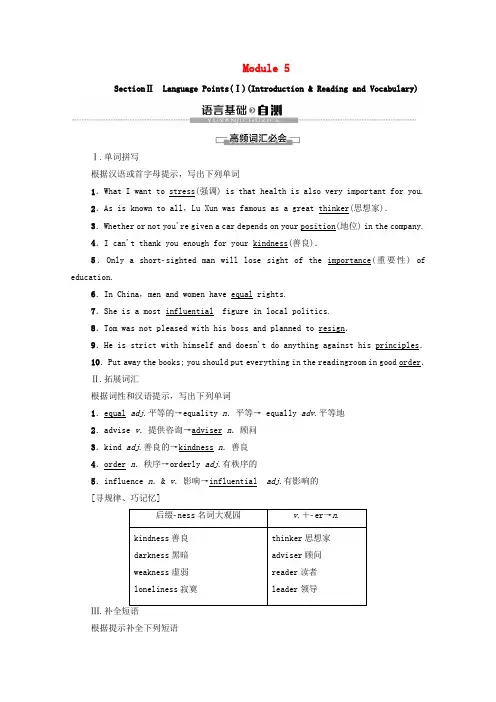
Module 5SectionⅡLanguage Points(Ⅰ)(Introduction & Reading and Vocabulary)Ⅰ.单词拼写根据汉语或首字母提示,写出下列单词1.What I want to stress(强调) is that health is also very important for you.2.As is known to all,Lu Xun was famous as a great thinker(思想家).3.Whether or not you're given a car depends on your position(地位) in the company.4.I can't thank you enough for your kindness(善良).5.Only a shortsighted man will lose sight of the importance(重要性) of education.6.In China,men and women have equal rights.7.She is a most influential figure in local politics.8.Tom was not pleased with his boss and planned to resign.9.He is strict with himself and doesn't do anything against his principles.10.Put away the books; you should put everything in the readingroom in good order.Ⅱ.拓展词汇根据词性和汉语提示,写出下列单词1.equal adj.平等的→equality n.平等→ equally adv.平等地2.advise v.提供咨询→adviser n.顾问3.kind adj.善良的→kindness n.善良4.order n.秩序→orderly adj.有秩序的5.influence n.& v.影响→influential adj.有影响的[寻规律、巧记忆]后缀ness名词大观园v.+er→n.kindness善良darkness黑暗weakness虚弱loneliness寂寞thinker思想家adviser顾问reader读者leader领导根据提示补全下列短语1.be similar to 与……相似2.be at war with 与……交战3.bring up 养育;抚养4.follow one's advice 采纳某人的建议5.become famous for 因……而出名6.as a result 结果Ⅳ.选词填空选用上述短语的适当形式填空1.I tried to persuade Rose,but she didn't follow my advice.2.This house is similar to that house in size.3.At that time,his country was at war with Japan,so hearing from him was very difficult.4.It rained heavily yesterday.As a result,he didn't turn up at the meeting.5.His parents died in an earthquake when he was young,so he was brought up by his grandmother.[寻规律、巧记忆]“at+n.”短语集汇表示“结果”词汇荟萃at war在交战at hand在手边at rest在休息at peace处于和平状态at table在吃饭as a resultfinallyat lastin the endas a consequence背教材原句记句式结构仿写促落实1.Treat others in the wayyou want to be treated.己所不欲,勿施于人。
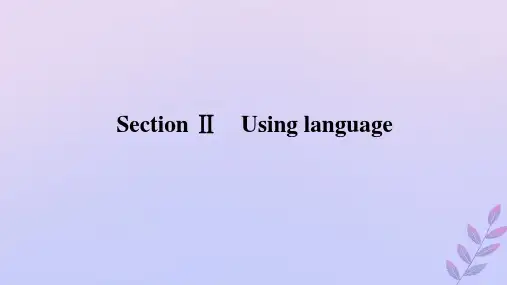
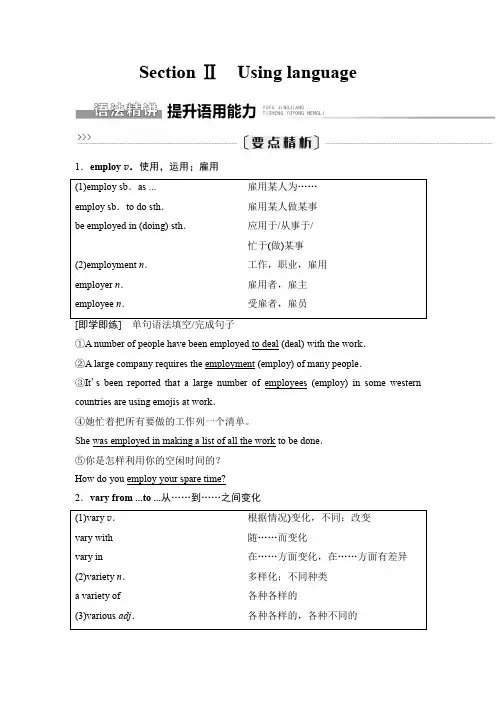
Section ⅡUsing language1.employ v.使用,运用;雇用(1)employ sb.as ...雇用某人为……employ sb.to do sth.雇用某人做某事be employed in (doing) sth.应用于/从事于/忙于(做)某事(2)employment n.工作,职业,雇用employer n.雇用者,雇主employee n.受雇者,雇员①A number of people have been employed to deal (deal) with the work.②A large company requires the employment (employ) of many people.③It's been reported that a large number of employees (employ) in some western countries are using emojis at work.④她忙着把所有要做的工作列一个清单。
She was employed in making a list of all the work to be done.⑤你是怎样利用你的空闲时间的?How do you employ your spare time?2.vary from ...to ...从……到……之间变化(1)vary v.根据情况)变化,不同;改变vary with随……而变化vary in在……方面变化,在……方面有差异(2)variety n.多样化;不同种类a variety of各种各样的(3)various adj.各种各样的,各种不同的[即学即练] 单句语法填空/完成句子①Join us to taste a variety (various) of fresh local food and drinks . ②When a predator lives on various (vary) species ,they are weakly linked . ③The stopping distance for cars varies with the speed they are travelling at . ④人的爱好和选择各不相同。
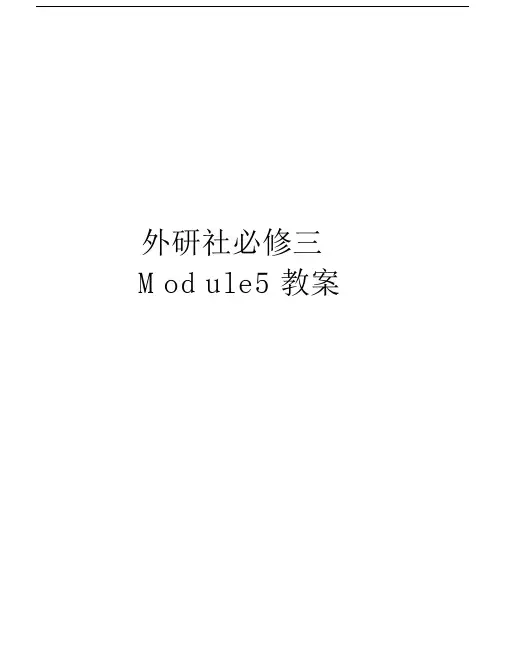
外研社必修三Mod ul e5 教案科目Teaching ContentTeaching Objectives学习—————好资料Teaching Plan英语年级高一教师许宝玉Book 3 : Module 5 Great People and Great Inventions of Ancient China( Reading and Vocabulary)1. Knowledge aims:(1)To help students understand the words and some useful expressions(2)To get the students have a better understanding of the text( 3)To train the students’ ability of guess words’ meaning by read the sentence (4)Learn to introduce a great person from some aspects---names and thoughts2. Language ability aims:Theoretical basis: High school English curriculum standards emphasize the ability toacquire and process information in English1). Can get the main information from the article and extract the main points2). Can understand the subject of the article, the author's intention3). Can extract, filter and reorganize the information in the article4). Can use the context to guess new words(1)Learn to read with some reading strategies(2) Improve students ’ integrated abilitiesspeakingof and reading(3)Learn to introduce a great philosopher.3.Learning strategy aims:Vocabulary classificationEffective self-regulation during reading, English interaction, and task completion. Obtain relevant information through various channels, identify and apply effective resources.4.Cultural awareness and emotional attitude:To get the students learn more about the great people and great inventions of ancientChina 5. Teaching important points1.Know the pronunciations of new words. For the students, know the pronunciations of the words are really important. Only if they know them clearly, can they understand the words exactly.2. Talk about the great people and great inventions of ancient China. Get the general information about the great people, such as Confucius, Mozi and Mencius.学习—————好资料Teaching Material and Students Analysis 6. Teaching Difficult Points1.How to describe a great person. Description is difficult for the students; the teacher shouldguide them to introduce the person from some aspects. For example, the teacher can ask the students to describe the person from these aspects: names, birthplace,and thoughts.2.Let the students understand the passage better and let them grasp key words and phrases.The content of my lesson is Module 5 in New Standard English Book 3. This module is aboutthe Great People and Great Inventions of Ancient China. It introduces three famous people inChina. They are Confucius, Mozi and Mencius. By studying of this unit, we ’ ll enable students to know more about the great people and great inventions in ancient China. At the same time,let the students learn how to describe a person. Students in grade one in senior high school. /Average class/ They haven ’ t completely changed their smethodofstudying and cannotinvolve themselves in the class activities fully. They have difficulty in expressing themselvesin English clearly. Some students are not very interested in English.Teaching Aid Teaching ProcedureLead –in Pre-reading Blackboard; A recorder; Computer; A projectorThe teacher’ s activityShow Ss some pictures of great people in China and in theworld and ask them who is your most admired or respectedgreat people of China ?Task 1:Complete the gaps with the words in the box onpage41.Then ask individuals to show their answers.equal philosopher thinker treat state rulerphilosophy teachings war look afterTask 2:Q1: Do you know any philosopher of ancient China?Guess the people by what they said.Q2: Look at the pictures and answer thefollowingquestions.The students’purposeactivityStudents need to havLead ina brain-storm and 3minsspeakloudly.The students8minsdivide Strengthenthemselves into basisgroups andwork togetherand give out theanswers.Ss can have avivid and afurtherunderstanding学习—————好资料Who is he? What was his main idea?of the personPre-and keep their learninginterest inlearning.Task 3:While –reading Read these statements and tick the ideas that Confuciustaught.Skimming:Task 1:Ss should read the material fast to find the words andphrases in the passage that match these definitions. Task 2:Ask students to read the passage as quickly as they can,then read questions on the screen and choose the correctanswers.Students readthe sentencesand make achoice.The studentsread the 25minspassagecarefully andgive out theanswers.Scanning:Task 1. (Individual work)Ask Ss to read the three parts carefully and fill in theblanks. And teacher will check the answers.DeeperlearningThe studentsfinish the taskcarefully anddiscuss witheach other, andthen share theideas.学习—————好资料Task 2. (Individual work )Ask Ss to read the the passage again and decide if these following sentences are true or false.1.Confucius lived in a country where there was no wara long time ago.2.Confucius was a philosopher whose influence has been the greatest for more than 2000 years.3.Mencius was a student taught by Confucius.4.Some rulers followed the advice which was given by Mencius.5.Mozi was a man who lived an unusual life.Task 3. ( Group work)Ask Ss to read the the sentences carefully and try to translate them into Chinese. They can finish it in the form of group.Summary The studentsread the Improve passage and the Reading questions again Skillsandfinish the taskon their own.consolidationTask 1: Discussion these questions.Which of the following opinions do you think is the mostimportant? And why?(1)All men are equal.Post- reading(2)Kindness and love.(3)Peace.Task 2:Peace is quite important. Peace and development are thetwo subjects of our modern world. In history, wars haveLinkingtheknowledge Students need learned withreal life and to organize infiltrating their language the concept of and words andmoraleducation to give a brief help students answer.establish acorrectoutlook onlife, enhancesocialresponsibility,学习—————好资料caused great damage to people. Many people lost their lives,many people became homeless, and people led a hard andpoor life. People all over the world wants a peacefulenvironment.Anybody can help others with a willing heart. Let’ s try our best to lend others a helping hand and work hand inhand to create a harmonious society.and comprehensiv ely improve humanistic quality.8minsWrite a passage about a person you admire most or you well know and introduce he or she from some aspects in Homeworkthe writing paper. Hand in before next class.Assignment Students need Deepento get enough students' information overall about the the impression of person and the text finish acompositionbased on that.2mins。
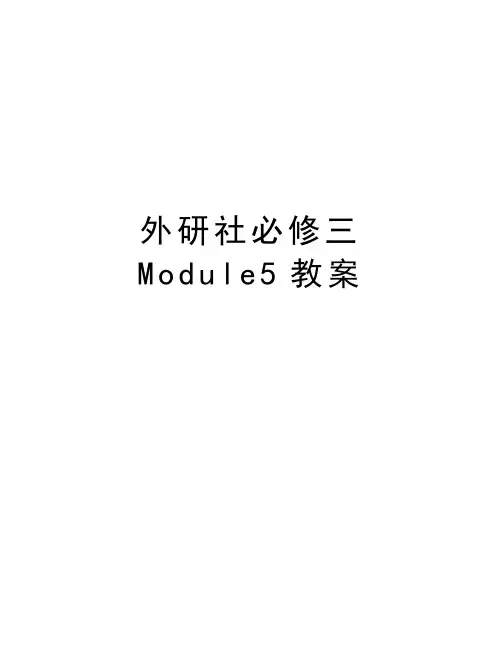
外研社必修三M o d u l e5教案Teaching PlanWho is he? What was his main idea?Task 3:Read these statements and tick the ideas that Confucius taught.of the personand keep theirinterest in learning.Students readthe sentencesand make achoice.Pre-learningWhile–reading Skimming:Task 1:Ss should read the material fast to find the words andphrases in the passage that match these definitions.Task 2:Ask students to read the passage as quickly as they can,then read questions on the screen and choose the correctanswers.Scanning:Task 1. (Individual work)Ask Ss to read the three parts carefully and fill in theblanks. And teacher will check the answers.The studentsread thepassagecarefully andgive out theanswers.The studentsfinish the taskcarefully anddiscuss witheach other, andthen share theideas.25minsDeeperlearningTask 2. (Individual work )Ask Ss to read the the passage again and decide if these following sentences are true or false.1. Confucius lived in a country where there was no war a long time ago.2.Confucius was a philosopher whose influence has been the greatest for more than 2000 years.3. Mencius was a student taught by Confucius.4.Some rulers followed the advice which was given by Mencius.5. Mozi was a man who lived an unusual life. Task 3. ( Group work)Ask Ss to read the the sentences carefully and try to translate them into Chinese. They can finish it in the form of group. SummaryThe students read thepassage and thequestions again and finish the taskon their own.Improve Reading SkillsconsolidationPost- readingTask 1: Discussion these questions. Which of the following opinions do you think is the mostimportant? And why? (1)All men are equal. (2)Kindness and love. (3)Peace. Task 2:Peace is quite important. Peace and development are the two subjects of our modern world. In history, wars haveStudents needto organize their language and words and give a brief answer.Linking theknowledge learned with real life and infiltrating the concept of moraleducation to help students establish a correct outlook on life, enhance socialresponsibility,。
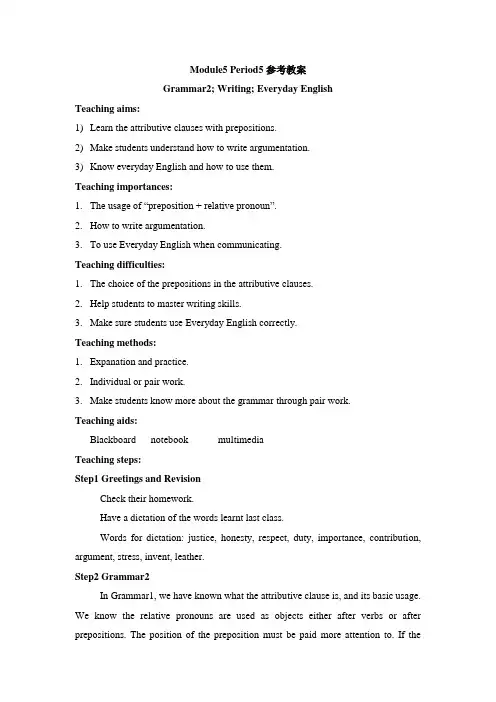
Module5 Period5参考教案Grammar2; Writing; Everyday EnglishTeaching aims:1)Learn the attributive clauses with prepositions.2)Make students understand how to write argumentation.3)Know everyday English and how to use them.Teaching importances:1.The usage of “preposition + relative pronoun”.2.How to write argumentation.3.To use Everyday English when communicating.Teaching difficulties:1.The choice of the prepositions in the attributive clauses.2.Help students to master writing skills.3.Make sure students use Everyday English correctly.Teaching methods:1.Expanation and practice.2.Individual or pair work.3.Make students know more about the grammar through pair work.Teaching aids:Blackboard notebook multimediaTeaching steps:Step1 Greetings and RevisionCheck their homework.Have a dictation of the words learnt last class.Words for dictation: justice, honesty, respect, duty, importance, contribution, argument, stress, invent, leather.Step2 Grammar2In Grammar1, we have known what the attributive clause is, and its basic usage. We know the relative pronouns are used as objects either after verbs or after prepositions. The position of the preposition must be paid more attention to. If thepreposition is used before the relative pronoun,Step3 WritingArgumentation is an essay which tells readers your own opinions about one topic.It usually is divided into three parts.The first part is introduction, which gives some general facts about the subject.The second part is illustration. This part will illustrate your ideas in detail.The third part is conclusion, which gives the writer’s final opinion.Step4 Everyday EnglishWe all know language is for communication.So everyday English is what we often use in our daily life.So it is important for us to master it.Let’s look at the phrases in the box.You can discuss with your partner, and then fill up the dialogue.Step5 Summary and HomeworkIn this period, first, we continued to learn attributive clauses introduced by “preposition + which/whom”. We also did some exercises to consolidate the,. Second, we learned how to write argumentation, which is a very important writing style. Finally, we mastered some Everyday English.Homework:Do the extra exercises about the attributive clause.板书设计Module5 Great People and Great Inventions of Ancient ChinaPeriod5 Writing; Everyday EnglishThe attributive clause(1)prep.+whom/which(2)when(time)=at/in/on/during whichwhere(place)=at/in/on whichwhy(reason)=for which。
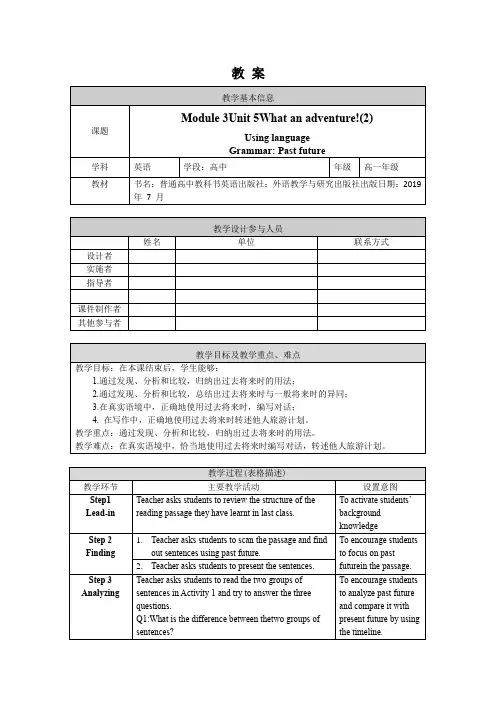
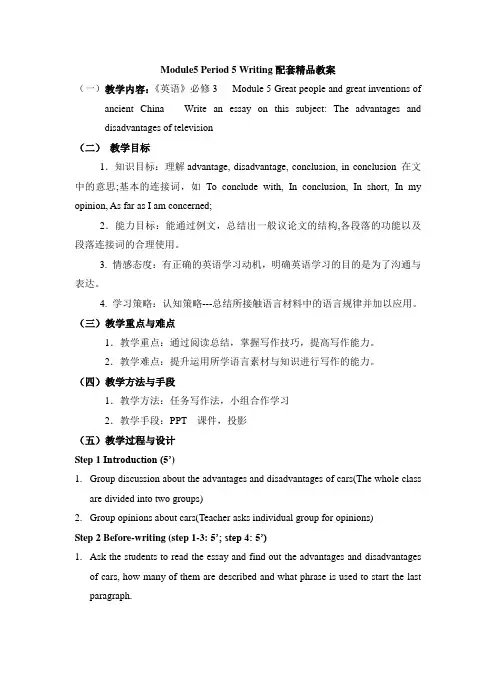
Module5 Period 5 Writing配套精品教案(一)教学内容:《英语》必修3 Module 5 Great people and great inventions of ancient China Write an essay on this subject: The advantages and disadvantages of television(二)教学目标1.知识目标:理解advantage, disadvantage, conclusion, in conclusion 在文中的意思;基本的连接词,如To conclude with, In conclusion, In short, In my opinion, As far as I am concerned;2.能力目标:能通过例文,总结出一般议论文的结构,各段落的功能以及段落连接词的合理使用。
3. 情感态度:有正确的英语学习动机,明确英语学习的目的是为了沟通与表达。
4. 学习策略:认知策略---总结所接触语言材料中的语言规律并加以应用。
(三)教学重点与难点1.教学重点:通过阅读总结,掌握写作技巧,提高写作能力。
2.教学难点:提升运用所学语言素材与知识进行写作的能力。
(四)教学方法与手段1.教学方法:任务写作法,小组合作学习2.教学手段:PPT 课件,投影(五)教学过程与设计Step 1 Introduction (5’)1.Group discussion about the advantages and disadvantages of cars(The whole classare divided into two groups)2.Group opinions about cars(Teacher asks individual group for opinions)Step 2 Before-writing (step 1-3: 5’; step 4: 5’)1.Ask the students to read the essay and find out the advantages and disadvantagesof cars, how many of them are described and what phrase is used to start the last paragraph.2.Read again and match the essay paragraphs with the descriptions3.Get the students to find out the structure of the essay: generalfacts-----advantages-----disadvantages-----personal opinions, and the transition words or sentences in each paragraph4.Ask the students to make an outline for their writing by discussing the advantagesand disadvantages of television in groups of four(Prepare some words, phrases and transition words at the same time)Step 3 While-writing (15’)write and polish the composition individuallyStep 4 After-writing (10’)1.Exchange the composition with partners and improve each other’s composition;2.Choose one composition, show it on the projector and have the whole classcorrect it together.(Students express their opinions on them and the teacher makes comments.)Step 5 Assignmentpare the writing sample with your own composition and try your best toimprove your composition in terms of vocabulary, transition words, sentences and structure.2.Module Revision。
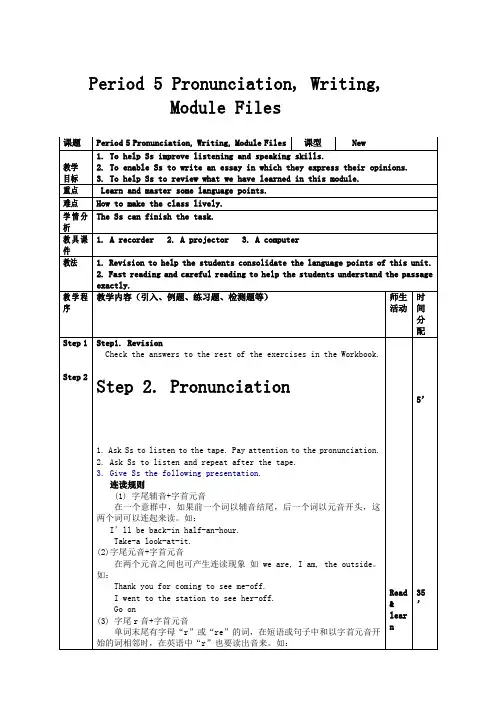
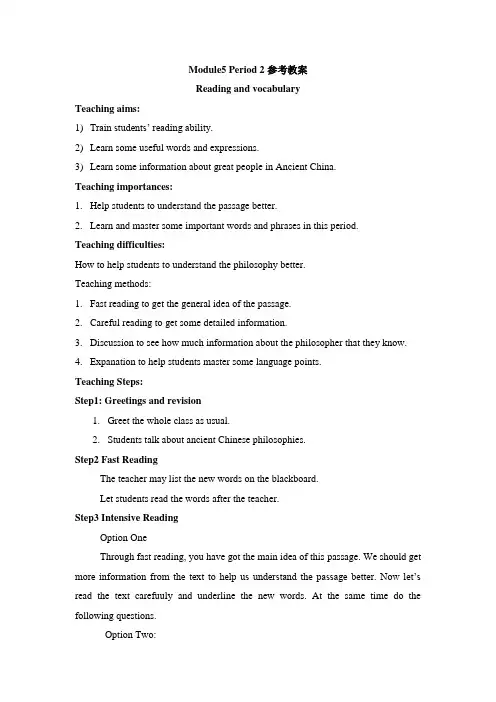
Module5 Period 2参考教案Reading and vocabularyTeaching aims:1)Train students’ reading ability.2)Learn some useful words and expressions.3)Learn some information about great people in Ancient China.Teaching importances:1.Help students to understand the passage better.2.Learn and master some important words and phrases in this period.Teaching difficulties:How to help students to understand the philosophy better.Teaching methods:1.Fast reading to get the general idea of the passage.2.Careful reading to get some detailed information.3.Discussion to see how much information about the philosopher that they know.4.Expanation to help students master some language points.Teaching Steps:Step1: Greetings and revision1.Greet the whole class as usual.2.Students talk about ancient Chinese philosophies.Step2 Fast ReadingThe teacher may list the new words on the blackboard.Let students read the words after the teacher.Step3 Intensive ReadingOption OneThrough fast reading, you have got the main idea of this passage. We should get more information from the text to help us understand the passage better. Now let’s read the text carefuuly and underline the new words. At the same time do the following questions.Option Two:Reading and DiscussionRead the passage carefully to choose the right answer.Step4 Summary and homeworkIn this period you have learned 3 great philosophers from ancient China. Their philosophy had great influence on the histrory and culture of China. So it is important for you to get more information about them.Homework :1.Copare the text with their history book.2.Try to find more and master the words and phrases.板书设计Module5 Great People and Great Inventions of Ancient ChinaPeriod 2 Reading and VocabularyOrder(n.) 1 an idea that influences the way you behave. PrincipleBring up 2 to start an organization or philosophy. Be similar toFound(v.) 3 the feeling that something is true and exists. ResignPrinciple 4 when people obey laws and rules and do not cause influential Belief 5 to look after children until they are adults. At war。
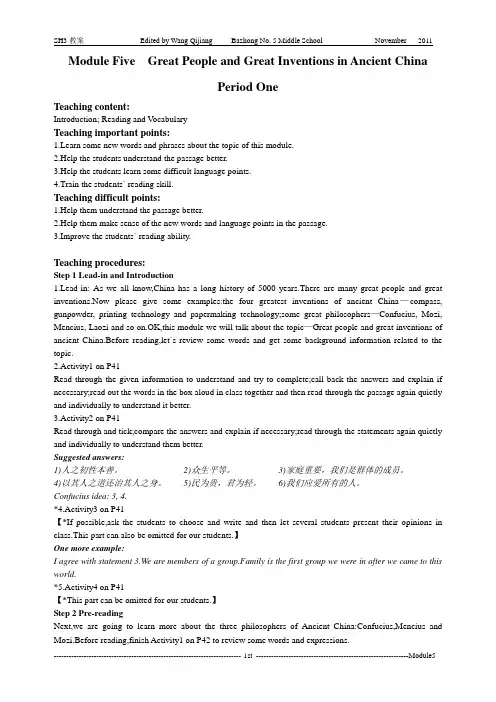
Module Five Great People and Great Inventions in Ancient ChinaPeriod OneTeaching content:Introduction; Reading and V ocabularyTeaching important points:1.Learn some new words and phrases about the topic of this module.2.Help the students understand the passage better.3.Help the students learn some difficult language points.4.Train the students` reading skill.Teaching difficult points:1.Help them understand the passage better.2.Help them make sense of the new words and language points in the passage.3.Improve the students` reading ability.Teaching procedures:Step 1 Lead-in and Introduction1.Lead-in: As we all know,China has a long history of 5000 years.There are many great people and great inventions.Now please give some examples:the four greatest inventions of ancient China—compass, gunpowder, printing technology and papermaking technology;some great philosophers—Confucius, Mozi, Mencius, Laozi and so on.OK,this module we will talk about the topic—Great people and great inventions of ancient China.Before reading,let`s review some words and get some background information related to the topic.2.Activity1 on P41Read through the given information to understand and try to complete;call back the answers and explain if necessary;read out the words in the box aloud in class together and then read through the passage again quietly and individually to understand it better.3.Activity2 on P41Read through and tick;compare the answers and explain if necessary;read through the statements again quietly and individually to understand them better.Suggested answers:1)人之初性本善。
外研版高中英语必修IIIModule 5 Great People and Great Invention of Ancient ChinaGrammar (2)武清区杨村一中Part 1.教案设计I. Teaching ContentDefining attributive clauses and the usage of of which, in whichII. Teaching Aims1. Target Language(1) Introduce what an attributive clause is .(2) Make the students learn to sum up grammatical rules themselves and make sure that the students master the grammatical items.(3) Make sure the students know the difference and master the usage of relative pronouns and relative adverbs.2. Ability GoalsLet the students learn how to define attributive clauses and understanding the meaning of each attributive clause in the reading .Ⅲ. Teaching Important Points1) To teach the use of attributive clauses;2) To master the use of relative pronouns (who, that, which, whom, whose) and relative adverbs ( where ,when, why).Ⅳ. Teaching Difficult PointsCompare the attributive clauses: where, when, whose, who, which and the attributive clauses: of whom, in which .V.Teaching methods1) Explanative and inductive method to make the students understand the grammar in real situation;2) Learn grammar through practice;3) Individual work or pair work to get all the students to take part in the class. VI. Teaching aidsA blackboard, a computer and a projector .VII. Teaching ProceduresStep 1. Lead-in (Through showing three pictures) Ask the students to describe the following pictures.Picture 1. a young and beautiful ladypicture 2. a high-tech planePicture 3. a great philosopherT: Young and beautiful, high-tech and great are all adjectives. They modify nouns and work as the attributive of nouns. We can use the clause to modify the nouns. eg,Picture 1. The lady who is young and beautiful teaches us English.Picture 2. A high-tech plane is a machine that/which can fly very fast and safely. Picture 3.Confucius is the philosopher whose influence has been the greatest.That’s to say, an adjective clause is used to d escribe a noun or a pronoun and called an attributive clause.Step2. (show on the screen) master the concept of the attributive clause.定语从句: 是指在复合句中,修饰名词或代词的从句.被定语从句所修饰的名词或代词叫做先行词。
引导定语从句的词叫关系词。
定语从句分为:The Restrictive Attributive Clause 限制性定语从句The Non-Restrictive Attributive Clause 非限制性定语从句Step3.Grammar 1T: 1) Now please go through the text to find all the attributive clauses in the text and tell us what the meaning of each sentence is.1. Ancient China was a place where states were often at war with each other.2. But it was also a time when there were many great philosophers.3. Confucius is the philosopher whose influence has been the greatest.4. Mencius was a thinker whose teaching was very similar to those of Confucius.5. Mencius believed that the reason why man is different from animals is that man is good.6. Mozi was another teacher who was very influential.7. He came from a family which was very poor.8. As a result , he spent many years trying to find a state where people would follow his teaching.9. Mozi taught that we should love all human beings and look after those who are weaker than ourselves.2) finish off activity 2 and 3 on page44.and sum up:引导定语从句的关系词有:指代人 who, whom, that指代事物 which, that 关系代词在句中替代先行词作主语或宾语所属关系词whose, of which →作定语指地点 where指时间 when 关系副词在句中替代先行词作状语指原因 why3)compare the use of relative pronouns and relative adverbs.a). This is the school ______ we studied last year. ( where )This is the school ______ we visited last year. (that/which/X)b). I’ll remember the days ______ we spent on the countryside .(which/that /X)I’ll remember the days _____we joined the army. (when)c). I bought a new book _____cover is very beautiful. (whose)d).I have come around to explain the reason _____ I was absent from the meeting. (why)Summarize: whether relative pronouns or relative adverbs are used in attributive clauses, it is decided by function of them in the attributive clause.4) Practice: Finish off activity 4 on page 44.Step 4. Grammar 2T: Please turn your book to page 47Activity 1.Match the sentences in the two groups, which have the same meanings and see what differences between them.The following answers of the students:Sentence 1 can be matched with C.Sentence 2 can be matched with D.Sentence 3 can be matched with B.Sentence 4 can be matched with A.2) Ss: After observing each pair of sentences, students can draw the conclusion. Sentence 1---4, the prepositions are put before the relative pronouns. Sentences A---D, the prepositions are put in the attributive clauses after verbs. However, they still have the same meanings.3) Practice Activity 3 to consolidate the use of preposition + which or preposition + whom4) T: please look at the screen and pay attention to the following sentences .They have the same meaning.a). This is the house that/which the inventor lived inThis is the house in which the inventor livedThis is the house where the inventor lived.b) Ships take machines and other things back to the ports_____ they came from. Ships take machines and other things back to the ports_____ they came.Ships take machines and other things back to the ports from_____ they came. Keys : which; where; whichThe day_____ I’m forced to give up riding will be a sad day for me.The day _____ I’m forced to give up riding on will be a sad day for me. Keys: when; whichT: From the examples above we know that putting the proposition at the end of the clause is usually also possible in the statement. That is to say, Its meaning is the same with the other two situations. ( relative adverb and preposition + relative pronoun). Would you like to do more practice? Please finish the exercise in Activity 4 .you can do it with your partners. Several minutes later, let’s check. At last show the answers on the screen.We’re in the region in which printing was first invented.It is an invention of which he is proud.He is a man of whom I am afraid because he was invented something very dangerous. The machine at which you are looking is very old.Is that the inventor to whom you are talking.T:Boys and girls, besides the usage above, there is also another special use. Now please look at the following sentences carefully and sum up.Do you have anything that you want to say for yourself?You should hand in all that you have.This is the very book that I’m looking for.The only thing that we can do is to give you some money.This is the most interesting film that I’ve ever seen.What is the first American film that you have seen?Do you know the things and persons that they are talking about?Who is the boy that won the gold medal?Conclusion:1) 先行词是everything, nothing, anything, something, much, little, none等不定代词, 引导定语从句用that2) 先行词被形容词最高级或序数词修饰时, 引导定语从句用that。